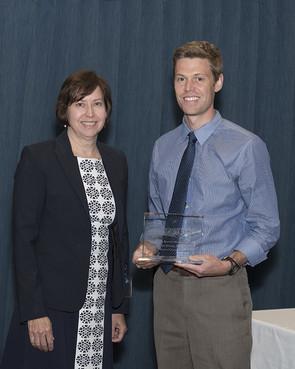
Penn State Clinical and Translational Science Institute has welcomed a new scholar into its program that invests in early-career faculty. Dr. Steven Hicks, assistant professor of pediatrics, was named into the institute’s KL2 Training Program, which gives researchers establishing themselves in their fields dedicated time to help their findings benefit human health more quickly while becoming successful, independent translational scientists.
“As a KL2 scholar I’ll have the opportunity to expand my expertise in biostatistics and community engagement through protected career development time,” Hicks said. “My research project will engage stakeholders from the community, academia and industry to advance autism research here at Penn State.”
Hicks’ research looks to use saliva samples from hundreds of children with autism spectrum disorder to find RNA differences that could be used to diagnose the disorder.
Hicks joins seven other scholars who started in January after a competitive application process: Oluwamuyiwa Winifred Adebayo, Yendelela Cuffee, Jessica Ericson, Steffany Fredman, Chandrika Gowda, Cara Rice and Kathleen Sturgeon. He fills a vacancy left by Andrea Hobkirk, who leaves the program after receiving a National Institutes of Health Mentored Patient-Oriented Research Career Development Award grant.
“We are incredibly proud of Dr. Hobkirk as she strengthens her career in clinical and translational science,” said Dr. Diane Thiboutot, KL2 co-director. “The KL2 program is set up to create independent scientists. By securing another source of funding, Dr. Hobkirk is entering the next stage of her career. We hope that she has learned beneficial skills for continued growth through her time with our program.”
Hobkirk’s project will use magnetic resonance imaging – commonly called MRI – to investigate how brain function changes as smokers switch to low nicotine cigarettes for six weeks. Low nicotine cigarettes have been shown to progressively reduce smoking dependence and increase the chances of quitting. The findings will be used to identify changes in the brain that can be targets for cessation treatment. This project is funded by the National Institute on Drug Abuse and is a collaboration between Penn State Tobacco Center of Regulatory Science and Penn State Center for Nuclear Magnetic Resonance Research.
KL2 funding protects 75 percent of the scholar’s time to work on his or her research and career development, plus provides funding for research supplies, tuition support and money for travel to attend other learning opportunities. The program is customized based on the needs of the scholars, who develop an individual development plan with their mentors. KL2 scholars select from courses offered by university graduate programs including clinical and translational science, public health sciences and others. The career development plan for KL2 scholars provides them time to earn either a master of science in public health sciences or a graduate certificate in translational science, depending upon their prior level of training. Scholars also may enroll in one or more courses, as needed, without earning a certificate or degree.
The program is funded through the National Institutes of Health. Applications are anticipated to be accepted again in 2020. The program’s directors are Thiboutot at Penn State College of Medicine and Lorah Dorn at University Park. For more information, visit ctsi.psu.edu.